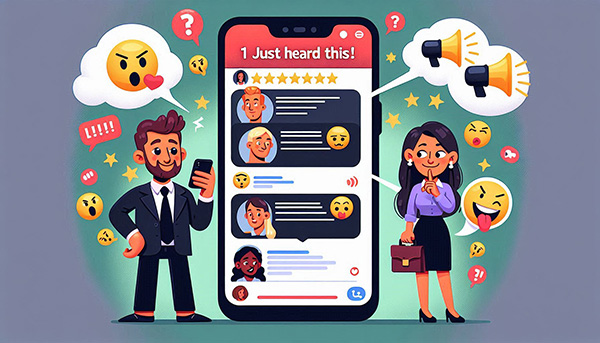By: John S. Morlu II, CPA
Let’s Talk About Loyalty (Yes, That Outdated Concept That Still Runs the World)
The Almighty Himself demands it.
We’re talking about God—the Creator of the universe, not your supervisor in HR. And He’s very clear about it: “You shall have no other gods before Me.” Translation? No divided attention. No two-timing. No spiritual side-hustles. Loyalty, or pack your things and go.
And if God, who is infinite and all-knowing, has a zero-tolerance policy for double-mindedness—how much more should you, the humble CEO of a business still trying to break even?
But let’s be honest: loyalty is a touchy subject. Say the word, and you’ll get three reactions:
1. The inspired.
2. The insecure.
3. And the instantly offended who think commitment is a trap.
These are the people who “just go with the flow,” which usually means flowing nowhere in particular. They fear loyalty because it means sticking around—and they don’t even stick to shampoo brands.
But here’s a plot twist: disloyalty always catches up.
Eventually, they find themselves ghosted by mentors, removed from group chats, blocked by opportunities, and soft-fired by everyone who once trusted them.
History has receipts.
From Judas to Brutus to your former head of marketing who leaked confidential files “by accident,” disloyal people end up either exiled, broke, or writing Medium posts titled “Why I Left…” followed by a company name no one asked about.
Because here’s the truth: no one wants to be around someone who could stab you and still show up for lunch like nothing happened.
Now, before we go further, let’s call out the elephant in the Slack thread.
These days, everyone’s a philosopher, usually after watching a 15-second TikTok from someone in a hoodie and LED lighting.
They throw around words like “toxic,” “gaslighting,” and “loyalty” like they’re throwing seasoning on fries—just a sprinkle here and there for drama.
And one phrase we hear way too often is:
“Oh, they’re just playing the loyalty card.”
Like that’s a bad thing?
What’s next—accusing someone of being too dependable?
Calling out “excessive trustworthiness”? Please.
Let’s make something clear:
Loyalty is not sucking up.
It’s not fake smiles, back-pats, or typing “#ProudToBeHere” while secretly updating your resume.
Real loyalty is rare. And powerful.
It’s not cute. It’s not trendy. It’s not for the faint of heart. But it’s the invisible force that keeps companies standing, families together, and kingdoms from falling.
And sadly, it only takes one disloyal person—especially someone close to the core—to blow the whole thing up. No need for fireworks. Just a little gossip, a leaked memo, a late-night vent session with the competition—and boom. Done.
So now the real question becomes:
How do you actually know when someone is loyal?
Not by how loud they clap at team meetings.
Not by how many emojis they use in Slack.
But by their actions. The consistent, quiet ones.
Let’s break it down. (And yes, it’s going to be both uncomfortable and wildly refreshing.)
1. Consistent, Proactive Communication
(A.K.A. The “I shouldn’t have to summon you like a ghost” principle)
What it actually looks like:
- They tell you what’s happening before it becomes a crime scene.
- They warn you when something’s going sideways—before customers start tweeting about it.
- They keep you in the loop about team morale, client issues, and who’s quietly planning a workplace coup.
Simple Rule: Loyal people don’t make you guess. This is not a murder mystery. You’re not Sherlock. You’re a leader, not a psychic.
Fun(ish) Fact: NASA once lost a $125 million spacecraft because one team used inches and the other used centimeters.
Nobody said anything. Nobody asked questions.
They just vibed their way into catastrophic failure.
Because, apparently, even rocket scientists sometimes go, “Eh, I’m sure it’ll work out.”
Lesson: If your employees can build rockets but won’t send an update email, you don’t have a loyalty problem—you have a silent disaster in the making.
Moral of the story: Speak now… or be the reason we crash into Mars.
2. Protecting the Brand and Reputation
(A.K.A. Don’t Smile in Public and Slap Us in Private)
What it looks like:
- They shut down gossip faster than a grandma shuts down bad manners at Sunday dinner.
- They talk positively about the company—even when there’s no bonus involved.
- They defend the business when it’s under attack, not join the mob with popcorn.
Rule of Thumb: What people say when you’re not in the room is the real performance review. Spoiler alert: HR isn’t grading it—karma is.
Funny (and painfully accurate) Truth: Some folks post, “Proud to be part of this amazing journey!” on LinkedIn at 9:00 AM and by 9:05 they’re in the group chat like:
“This place is a circus. I’m just here for the snacks.”
Pick a lane, Brenda. You can’t be brand ambassador and backroom hater in the same hour. That’s not versatility—that’s betrayal in business casual.
Moral of the story:
Loyalty means being the same person in meetings, messages, and mirror selfies. Anything else? That’s acting. And this ain’t Broadway.
3. Staying During Hard Seasons
(A.K.A. Not Jumping Ship the Moment the Free Coffee Runs Out)
What it looks like:
- They don’t vanish the moment things get bumpy—like a magician with job alerts.
- They step up when others “mysteriously” take sick leave every Monday.
- They don’t abandon ship for $2 more and a “fun startup culture” with bean bags and zero profit.
Hard Truth: Anyone can smile when the money’s flowing and snacks are organic. Real loyalty is sticking around when the budget meeting feels like a funeral.
Funny Reality Check: Some people treat jobs like Tinder profiles.
“Oh look, this one offers free yoga and kombucha. Goodbye forever!”
Let’s be honest:
If your loyalty can be bought with flavored water and a ping-pong table, you were never on the team—you were just renting a desk.
Moral of the story: Loyal people don’t flee when the boat leaks—they grab a bucket.
Everyone else? They’re already on LinkedIn, typing: “Excited to announce I’ve joined a new adventure…” Translation: I got a mug.
4. Acting in the Company’s Best Interest
(A.K.A. The “I’m Not Just Here for the Wi-Fi” Mindset)
What it looks like:
- They look for ways to save time and money like it’s their grandma’s retirement fund.
- They fix things without a committee, a memo, or a three-week “alignment” meeting.
- They say “no thanks” to shady side gigs that look a little too much like industrial espionage.
Smart Thinking: Loyal employees don’t just clock in—they buy in. They think like owners… just without the yacht or the stress ulcer.
Corporate Comedy Moment: If your worker is secretly running a rival business on the company laptop and using your printer for their side hustle flyers, congrats—you’ve hired a competitor, not a team member.
Let’s be real: The loyal ones aren’t trying to build their empire on your payroll. They’re not sneaking off to “take calls” while mysteriously muted on Zoom. They’re not the ones asking, “Do we really need to pay taxes?”
Moral of the story: If they treat the company like a rental car—flooring it, leaving trash in the back seat, and returning it with no gas—they’re not loyal.
They’re liabilities in khakis.
5. Respecting Boundaries and Leadership
(A.K.A. Stop Auditioning for the Boss’s Job While Still Messing Up Your Own)
What it looks like:
- They don’t sneak off to whisper complaints to “higher-ups” like it’s an episode of Survivor: Office Edition.
- They don’t agree in the meeting, then start a secret rebellion in the parking lot.
- They help the team move forward, not sideways into chaos and Slack drama.
Clear Signal: Loyalty means respecting the chain of command—not swinging from it like a corporate Tarzan.
Reality Roast: Some folks think leadership is a choose-your-own-adventure book. If they don’t like your decision, they “just check with someone else.”
That’s not collaboration. That’s insubordination with extra steps.
Satirical Snapshot: If your team member acts like they’re one motivational quote away from a coup, watch out. Today it’s “we just want transparency,” tomorrow it’s a full-on Game of Thrones episode at the Monday check-in.
Moral of the story: You can’t lead a team where everyone thinks they’re the captain.
This isn’t a pirate ship.
Respect the structure, trust the process, and save the mutiny for TikTok.
6. Protecting Confidentiality
(A.K.A. Zip It, Spill Nothing, and Please Don’t CC the World)
What it looks like:
- They don’t treat company secrets like gossip appetizers at brunch.
- They keep private talks private—not “accidentally forwarded to Karen from HR, the client, and their cousin.”
- They don’t turn your company group chat into TMZ: Startup Edition.
Golden Rule: If they protect your secrets, they protect your trust. If they forward them… well, enjoy your internal drama going viral.
Modern-Day Horror Story: You say something confidential in a one-on-one… and five minutes later it’s in the team group chat with emojis and a “👀 just heard this!”
At that point, your NDA might as well be a napkin with crayon writing.
Office Espionage Alert: Some folks gossip like it’s cardio.
They’re not just leaking info—they’re practically live-streaming it.
If your staff knows the CEO’s salary, the upcoming merger, and what snacks are being cut—and it’s not even lunchtime—you don’t have a loyalty issue, you’ve got a walking newsletter.
Moral of the story: If someone treats sensitive info like storytime, they’re not loyal—they’re just an unpaid reality show narrator.
And nobody asked for Season 3 of “As The Office Turns.”
7. Helping Others Grow
(A.K.A. If You’re the Smartest Person in the Room, Stop Holding Everyone Hostage)
What it looks like:
- They train the new hire without acting like they’re doing community service.
- They help teammates without sighing like they’re being forced to donate a kidney.
- They genuinely want the team to win—not just be crowned the lone genius on a sinking ship.
Real Loyalty = Sharing knowledge, not hoarding it like it’s the last avocado at Trader Joe’s.
Let’s Be Honest: Some folks guard knowledge like it’s the secret Krabby Patty formula.
Ask them a question and suddenly it’s, “Oh… that’s just something I do intuitively.”
Sir, it’s an Excel formula—not a family heirloom.
Office Olympics Moment: The loyal ones aren’t keeping all the how-tos in a folder called “If I Ever Leave.” They’re not planning a dramatic exit with a USB stick full of company knowledge and a smirk. They teach. They share. They don’t treat learning like an exclusive invite-only event.
Moral of the story: If they want to be the only one who knows how to fix the printer, file taxes, or talk to clients, they’re not a team player—they’re a job security hoarder.
Loyalty lifts. Ego locks.
Choose your coworkers accordingly.
8. Representing the Company Well Outside Work
(A.K.A. Not Trashing Your Employer at Brunch or in the Comments Section)
What it looks like:
- They wear the company hoodie like it’s team spirit—not court-mandated attire.
- They refer great clients or talent without acting like they deserve a parade.
- They speak positively about the company without needing a bonus, a spotlight, or a LinkedIn camera crew.
Big Picture: If they only act proud when it benefits them, they’re not loyal—they’re just brand opportunists with Wi-Fi.
Office Reality Check: You know the type.
On social media: “Proud to be part of this amazing journey!”
At the family BBQ: “They’re a mess. I’m just riding this out until my crypto takes off.”
Spot the Actor: Loyalty isn’t posting selfies in company merch for likes—then turning into a roving PR disaster when happy hour hits.
Moral of the story: If they only rep your brand when it’s convenient, that’s not loyalty—it’s personal marketing. True loyalty is sticking up for the company at weddings, networking events, and awkward UberPool conversations.
Even when the snacks are bad and the Wi-Fi’s worse.
9. Living the Company’s Vision, Mission, and OKRs
(A.K.A. Actually Caring Without Being Threatened With a Performance Review)
What it looks like:
- They’ve actually read the mission statement—and didn’t just scroll past it during onboarding like Terms & Conditions.
- They treat company goals like personal goals—not just a weird list in someone’s dusty Google Doc.
- They follow the leader’s direction without needing to be bribed, begged, or threatened with “circling back.”
Bottom Line: They don’t need a reminder every Monday—they already know the assignment and they show up like it’s game day.
Reality Slap: Some employees talk about the company’s mission like it’s folklore.
“Wait… we have values?”
Yes, Kevin. They’re not just inspirational posters in the breakroom. Those are actual things we’re trying to achieve.
Corporate Comedy Hour: Loyal employees don’t roll their eyes when OKRs are mentioned.
They don’t need a PowerPoint and interpretive dance to understand quarterly goals.
They just get it—and then they go do it, while others are still asking, “Is this on the test?”
Moral of the story: If someone only lives the mission when there’s a promotion on the line, they’re not loyal—they’re a motivational speaker with commitment issues.
Loyalty isn’t memorizing the mission. It’s becoming it. Without the theatrics.
10. Being Present—Mentally and Emotionally
(A.K.A. Your Body’s in the Chair, But Is Your Soul Still on Vacation?)
What it looks like:
- They show up on time, mentally switched on—not just wandering in like a confused extra in their own life.
- They stay focused during meetings instead of juggling Slack, Gmail, three open tabs of Amazon, and a suspiciously quiet Zoom camera.
- They treat their role like it matters—because spoiler alert: it does (even if it doesn’t come with a corner office or a bean bag).
Loyalty means presence. You can’t fight for a team you’re not really on. And if you’re zoning out every five minutes, you’re not a teammate—you’re a very polite ghost.
Common Sense Check: If someone’s body is at work but their brain is stuck in 2019, their exit interview is probably already written in their head—just waiting for the right moment to send.
Bonus Red Flag: If they nod during meetings but respond to nothing, congrats—you’re leading a human screensaver.
Moral of the story: Loyalty isn’t just clocking in. It’s tuning in.
If someone’s constantly “checked out,” don’t be surprised when they actually check out—laptop, stapler, and all.
Presence is power. Zombies belong in movies, not meetings.
Common Sense Check: Someone who’s always “checked out” may already have one foot out the door.
Final Word: Loyalty Is Quiet But Powerful
You won’t always see loyalty. It doesn’t always shout or seek attention.
But when someone stays late, speaks up, keeps things confidential, helps others, and lives your mission—you’ve got something special.
Signal to You: “This one is loyal. Reward them.”
Even small actions—like sending regular updates, offering help, or defending the company—can be a sign of deep loyalty.
And if you miss those signs? Well, you might lose the most valuable asset in your company: people who care.
A Final Thought: Beware the Judas, Seek the 5%
Throughout history, betrayal has often come from those closest to us.
Judas Iscariot, one of Jesus’s twelve apostles, betrayed him with a kiss, leading to his crucifixion.
Similarly, Marcus Junius Brutus, a trusted friend of Julius Caesar, participated in his assassination, prompting Caesar’s famous last words, “Et tu, Brute?”
These stories remind us that disloyalty can lurk even among trusted circles. But here’s the good news: true loyalty exists. It may be rare—perhaps only 5% of your team—but it’s there.
These individuals don’t just talk about commitment; they demonstrate it through action—sticking to the company’s mission, protecting its values, and showing up with purpose.
And let’s not forget: even God demands loyalty.
The very first commandment says, “You shall have no other gods before Me.” That’s not a suggestion—that’s a loyalty clause.
In Exodus, He even says, “I am a jealous God.” Why? Because any deep relationship—whether spiritual or organizational—requires total, undivided commitment.
So, keep your eyes open.
Watch closely.
Loyalty doesn’t wear a name tag. It shows up in action.
True loyalty lives in the 5%.
Find them in their deeds. Reward them accordingly.
About the Author
John is an entrepreneur, strategist, and founder of JS Morlu, LLC, a Virginia based CPA firm with multiple software ventures including www.FinovatePro.com, www.Recksoft.com and www.Fixaars.com . With operations spanning multiple countries, John is on a mission to build global infrastructure that empowers small businesses, entrepreneurs, and professionals to thrive in an increasingly competitive world. He believes in hard truths, smart execution, and the relentless pursuit of excellence. When he’s not writing or building, he’s challenging someone to a productivity contest—or inventing software that automates it.
JS Morlu LLC is a top-tier accounting firm based in Woodbridge, Virginia, with a team of highly experienced and qualified CPAs and business advisors. We are dedicated to providing comprehensive accounting, tax, and business advisory services to clients throughout the Washington, D.C. Metro Area and the surrounding regions. With over a decade of experience, we have cultivated a deep understanding of our clients’ needs and aspirations. We recognize that our clients seek more than just value-added accounting services; they seek a trusted partner who can guide them towards achieving their business goals and personal financial well-being.
Talk to us || What our clients says about us












